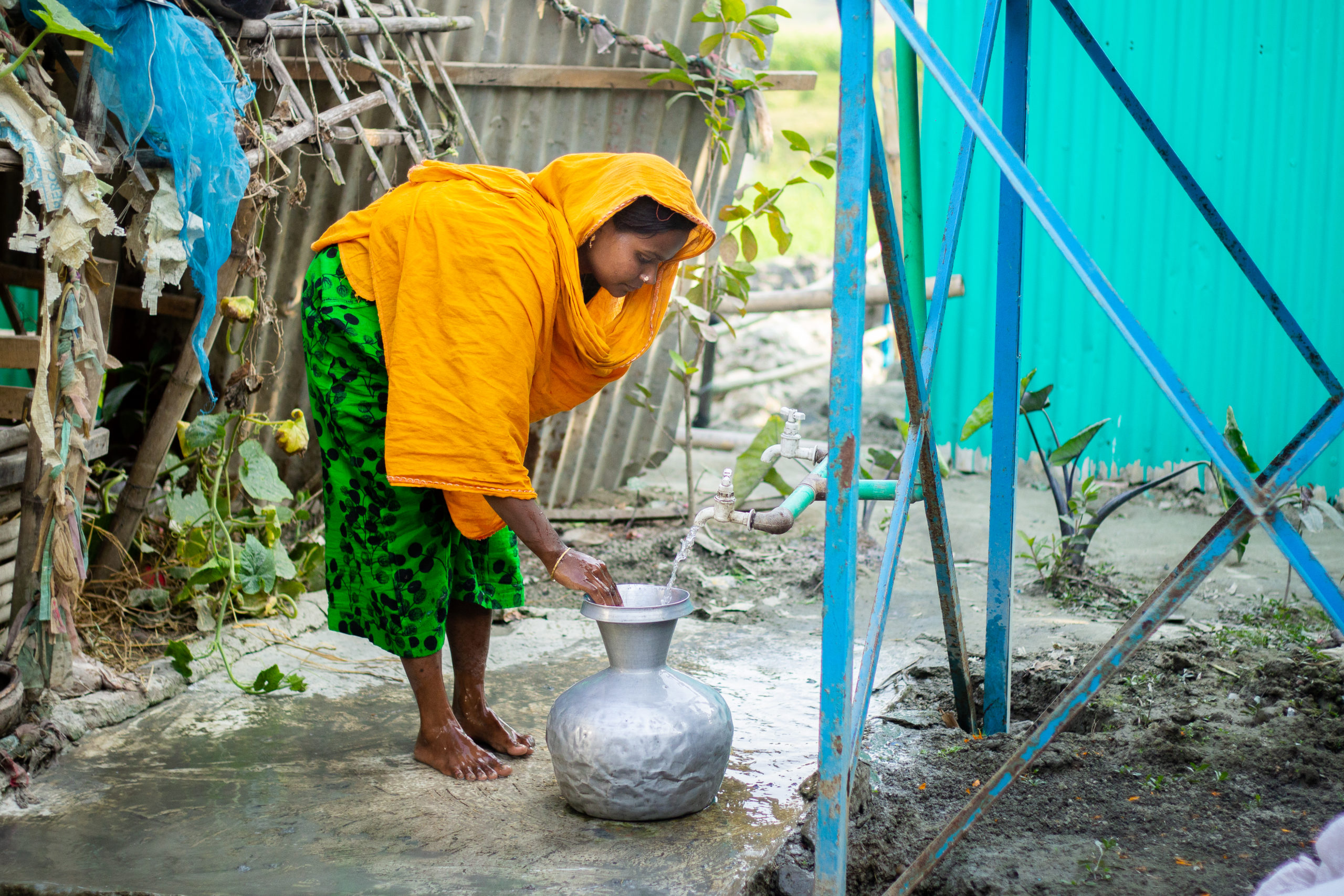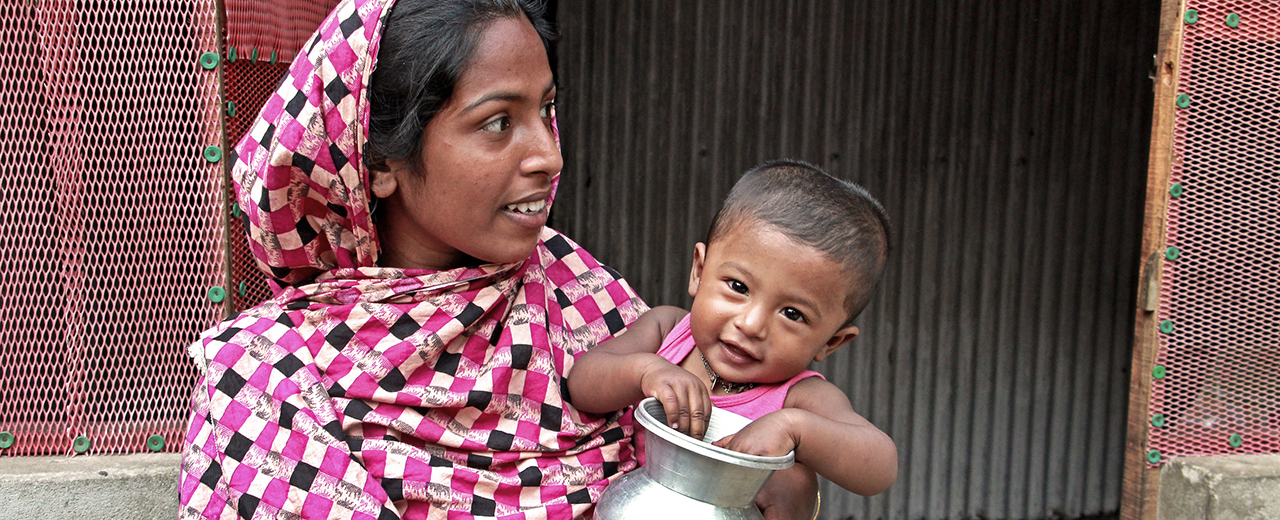 More fairness, one drop at a time
More fairness, one drop at a time
Living healthier with water filters
Look at your sleeve and touch the seam. Whether it's a T-shirt, a suit or a dress, we often don't notice the fine details of our clothes. Yet it is precisely these seams that turn individual pieces of fabric into a well-fitting garment. It is these seams that connect us to the textile workers in Bangladesh. Women and men like Rida, who spend many hours a day sewing these very seams to make our clothes. Unfortunately, Rida and her colleagues do this under very unsafe conditions and for far too low wages. Their drinking water is also heavily polluted due to the textile factories. Nevertheless, Nobel Peace Prize laureate Muhammad Yunus believes that the textile sector in Bangladesh has made an important contribution to the positive social developments of the last two decades. Among other things, the Millennium Development Goal of halving poverty was achieved in 2013 (Time, 2014). Still, much needs to change so that women and men can lead a good and, above all, healthy life.
Necessity
Clean drinking water for textile workers and their families in Bangladesh
Activity
A local NGO installs and maintains water filters that purify polluted groundwater, providing access to clean drinking water for textile workers' communities around the clock
Countable effort
The number of households that have access to clean drinking water through the filters and the number of water filters installed
Result
Textile workers and their families drink and use only clean and healthy water in their neighbourhoods, reducing waterborne diseases
Systemic effect
Permanently improved health for those who suffer doubly from the effects of the textile industry; less absences from school and work due to illness
Background
The expansion of the textile industry has had less than positive effects on the environment. Although Bangladesh, with its many rivers and wetlands, is a land of water, its people suffer from drinking water shortages that are among the worst in the world (textile network, 2017). Factors that make groundwater undrinkable include salinisation from rising sea levels and heavy rains during the monsoon (Time, 2014), widespread arsenic contamination and lack of regulation of industry (Sustainability, 2019). The factories where Rida and her colleagues work use a lot of water and chemicals to make our clothes. When the two come together, the result is very toxic wastewater. Due to a lack of adequate legislation, most of this wastewater is discharged back into the surrounding rivers untreated. In Dhaka, about 3,000 textile factories operate like this. As early as 2000, the WHO spoke of the “largest mass poisoning in history” (Perras, 2016). The rivers flowing around the factories are therefore often resplendent in the currently fashionable colours of the season. The groundwater, which is thus increasingly poisoned, is used for irrigation in agriculture as well as for laundry, personal hygiene, cooking and drinking. According to Ridwanul Haque, water expert and founder of the Bangladeshi NGO Agroho, a variety of textile dyes have been detected in various vegetable and fruit samples in areas far from the textile centre of Dhaka. This is also the case in the fish stocks of both nearby and distant rivers. The poisoned water is often the only source of water for the textile workers’ communities living in the immediate vicinity, but also further away from the factories. The effects on health range from skin irritation, gastrointestinal distress and poisoning to serious respiratory diseases and cancer (Sustainability, 2019).
The good deed
Today, your good deed will give Rida and her colleagues access to clean water. The partner organisation Agroho identifies communities that suffer greatly from water pollution from the textile industry. They organise the installation of so-called bio-sand filters. By storing the filtered water in their own tanks, the communities have access to clean drinking water around the clock, free of charge. This improves domestic hygiene and drinking water supply or, in some communities, makes it possible in the first place. In total, at least 90 households with an average of 5 members use one of these water filters. Thus, the health of all community members can be greatly improved in a very short time. After the installation is completed, Agroho visits the communities at regular intervals to check that the filters are in working order. The more filters that can be installed, the fewer people in Bangladesh will suffer from acute drinking water shortages.

About Bangladesh
Dhaka
Capital
166,303,494
Number of inhabitants
2,503.0
Gross domestic product per capita per year
Rang 129 von 191
Human Development Index
Bangladesh has 6 seasons instead of 4. There are grismo (summer), barsha (rainy season), sharat (autumn), hemanto (cool season), sheet (winter) and bashonto (spring).
About the organization and further information
Association
Drip by Drip e.V.
Website

Further information and source
- Matthias Naß, 12. Juni 2014. Bangladesch: Nähen für die Frauenbefreiung, Die Zeit, Hamburg.
- Mostafiz Uddin, 9. Oktober 2017. Nachhaltiger Umgang mit Wasser in Bangladesch, textile network, Bamberg.
- Christiane Grefe, 24. April 2014. Am schlimmsten ist die Versalzung, Zeit Online, Hamburg.
- Arne Perras, 7. April 2016. "Die größte Massenvergiftung der Geschichte", Süddeutsche Zeitung, München.
- Sakamoto M., Ahmed T., Begum S., Huq H., 2. April 2019. Water Pollution and the Textile Industry in Bangladesh: Flawed Corporate Practices or Restrictive Opportunities?, Sustainability 2019.




